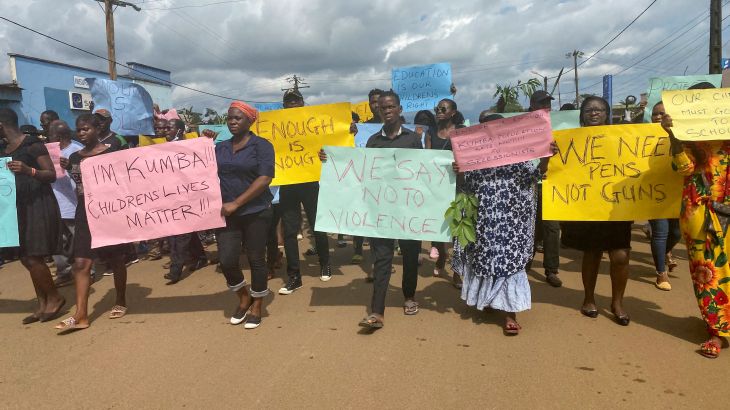
Will Cameroon’s Anglophone crisis ever end?
On Wednesday, November 4 at 19:30 GMT:
A deadly attack at a school in southwestern Cameroon has made headlines worldwide and brought fresh attention to a protracted conflict between government forces and secessionists.
At least seven children were killed and several others hurt when attackers with guns and machetes stormed the Mother Francisca International Bilingual Academy in Kumba, a city in the Southwest Region, on October 24. No group has yet claimed responsibility, but the government blames Anglophone separatists who have sought a boycott on education.
The assault horrified people across Cameroon, many of whom added the hashtag #EndAnglophoneCrisis to social media posts urging the government and Anglophone secessionists in the predominantly English-speaking Southwest and Northwest regions to find common ground. At least 3,000 people have been killed in violence by separatists and government forces since October 2017, when Anglophone secessionists self-declared the English-speaking state of Ambazonia in response to years of marginalisation by the Francophone majority. At least 600,000 people have been displaced according to the International Crisis Group.
In July the government held ceasefire negotiations with one group of secessionist movement leaders. But the separatists are divided, with rivals jostling for power and influence in the English-speaking regions. Secessionist movement officials loyal to jailed leader Sisuku Julius Ayuk Tabe were the only ones who joined the ceasefire talks, which soon became deadlocked.
Cameroon’s president Paul Biya recently announced the country’s first regional elections will go ahead in December, and will include the Anglophone regions. It’s part of a government effort to subdue the separatists and follows the granting of special status to the Anglophone regions by parliament in December 2019. But some opposition parties say the ruling Cameroon People’s Democratic Movement must first solve the crisis in the Anglophone regions and make changes to electoral laws before going ahead with regional elections. Human rights monitors have raised alarm over the arrest and detention of opposition party members who recently protested against the central government.
We’ll trace the fault lines in Cameroon and see if there is any prospect of agreement and change. Join the conversation.
In this episode of The Stream we are joined by:
Edwin Ngang, @GovAmba
Senior Presidential Adviser, Republic of Ambazonia
ambazonia.org
Eric Acha, @EricAcha1
Executive Director, African Policy Forum
africanpolicyforum.org
Kah Walla, @kahwalla
President, Cameroon People’s Party
kahwalla.com